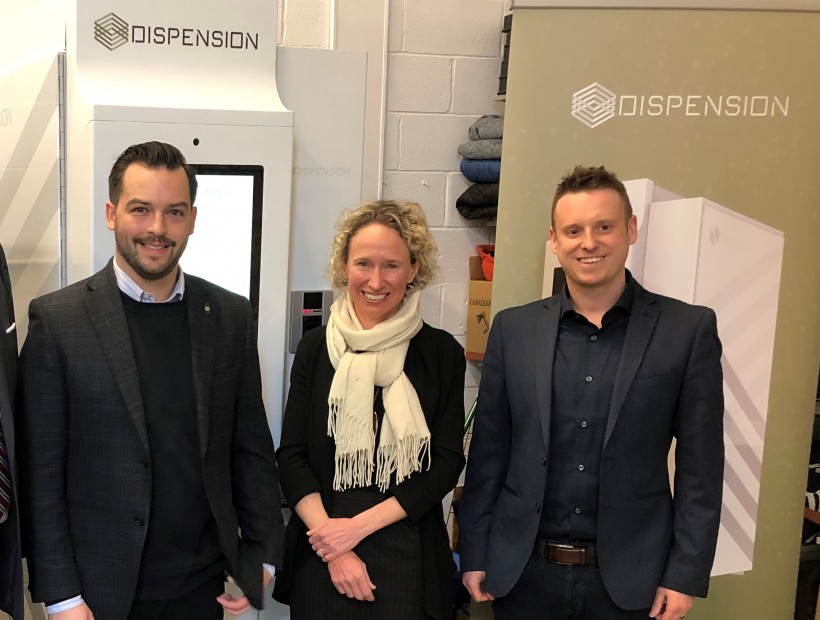Dispension Industries, which makes opioid dispensing equipment to help prevent overdoses, has bagged a $500,000 loan from the Atlantic Canada Opportunities Agency and will install five of its machines in cities across Canada.
Founded by President Corey Yantha and brothers Matthew and Brad Michaelis, Dartmouth-based Dispension’s MySafe kiosks allow authorities to distribute opioids to registered users in a controlled manner, with the aim of preventing overdoses.
The kiosks are being installed by the non-profit MySafe Society. Its founder, Dr. Mark Tyndall, is a former executive director of the B.C. Centre for Disease Control and helped create the first legally sanctioned safe injection site in North America.
“This is a way that people who do need the opioids can actually access them in a safe, secure manner,” said Yantha. “The major benefit ... is that it’s a scalable, low-cost and data-driven way to provide people with access to a safe supply of prescribed medication.”
Since December, a prototype kiosk has been deployed in Vancouver. It has dispensed close to 4,000 doses of medication, primarily a form of synthetic heroin called hydromorphone.
The kiosks use touchless palm scanners to identify pre-approved users, who are limited to one dose of narcotic per day.
The five new MySafe kiosks will be installed in various locations: Dartmouth; London, Ontario; and Vancouver and Victoria in British Columbia. The existing Vancouver kiosk will be replaced with two new ones.
The ACOA loan will help pay for the manufacture of 20 kiosks, including the five that are shipping this month.
Drug users who have previously experienced overdoses or whose urine tests positive for fentanyl can be referred to the MySafe program by public health workers at overdose prevention sites and other locations.
Yantha compared the user experience of the kiosks to that of banking machines, with the identity verification process taking only seconds. He added the product is unique for opioid-users. "Our research has identified a few competitors in the cannabis space, but nothing similar to our offering for narcotics dispensing,” he said.
He added that giving addicts access to regular controlled doses of narcotics could prevent them from buying potentially contaminated drugs from illegal dealers. It also reduces the incentive for users to fund drug purchases via criminality.
But MySafe program participants are not obligated to avoid consuming other drugs because the initiative’s focus is on harm reduction, rather than addiction treatment.
By using the palm scanner to track who accesses the kiosks and when they access them, Dispension can also gather useful data for public health researchers, such as what times of day users are most likely to consume drugs.
Another feature of MySafe that is relevant in the current crisis is its suitability for use during the pandemic, as people can receive their narcotics without person-to-person interaction. "People at highest risk for opioid overdose often lack stable shelter, access to proper hygiene, medication and basic food supplies, making them a particularly vulnerable group for COVID-19 exposure,” said Yantha.
Dispension has about seven employees, as well as a 12-person advisory board that includes Nova Scotia Liquor Commission CEO Greg Hughes and T’Sou-ke First Nation Chief Gordon Planes (British Columbia), among other business and government luminaries.
As the company begins to manufacture more kiosks, Yantha expects to scale up the employee pool.
“What we’ve worked on over the last several months is crystalizing the team and continuing to develop the technology, obviously for the MySafe project, but for other applications as well,” said Yantha. “But we’re going to look into growing the team ... and collaborating with post-secondary institutions.”
The team is also considering applying its secure dispensation technology to the pharmaceutical, lottery and cannabis markets.
Yantha said Dispension will probably raise money within the year, but the ACOA deal and a possible contract with Health Canada mean that funding is not a pressing concern -- particularly since the company has so far steered clear of dilutive financing.
“That doesn’t mean we’re not going to raise,” said Yantha. “It’s just that, at this point, we’ve managed to continue to grow without having to.”










